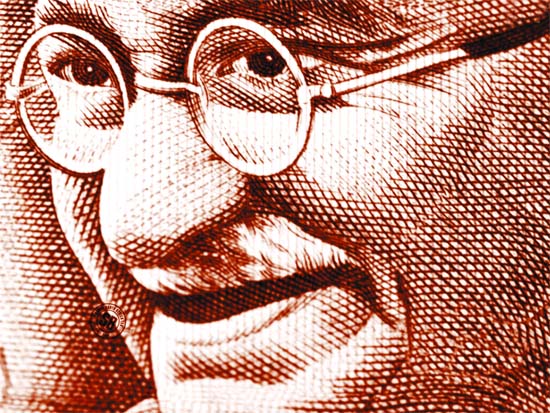As we celebrate the birth anniversary of Mahatma Gandhi, we must remember what he always stood for. Sant Rajinder Singh tells us what we can learn from him
October 2 is celebrated as the birth anniversary of Mahatma Gandhi. Gandhi lived the life of non-violence, and through his strength of character was able to lead the entire nation to independence. There are many interesting stories about the Mahatma related to non-violence and non-attachment.
One such story describes how Gandhi was boarding a train. Just as he was going inside, one of his shoes slipped off and got caught on the track. He tried to pull it but could not. People standing near watched him. When he was unable to pull the shoe from the track, he took off the other shoe as well and threw it on the track right at the spot where the first one was stuck.
The astonished passengers asked, “Why are you throwing the other shoe onto the trackIJ” Gandhi replied, “The poor man who finds the shoe lying on the track will now have a pair he can use.”
look at the vision. There are many lessons in this story. First, most people would be so upset about losing one shoe. They would be upset, hassled and distressed. If they are without shoes, then they would have to go barefoot, or wait to buy another pair. Their whole journey would be affected by the ‘loss’ of the shoe.
What did Gandhi doIJ He did not let the loss of the shoe mar his clarity of thinking. Rather, he weighed the situation, and came up with a brilliant idea. If he could not use the shoe, then someone else should get the help. Even in the loss, he was generous and caring. He thought he could use this as an opportunity to make a contribution to some poor person who might need shoes.
How many of us turn a bad situation into a good oneIJ How many of us see the brighter side of a difficult situationIJ We can learn a lot from Gandhi’s way of life.
This anecdote also shows us another aspect of the Mahatma’s life, which is non-attachment. When we are not attached to anything, we are free. If someone were attached to his shoes, then his whole train ride would have been caught up in the web of anger, despair and hopelessness. This would have completely drained that person.
By releasing his shoes, Gandhi showed how he was not attached to them. He could give them up and move on. He could spend the rest of his time in productive thoughts, instead of sulking over what could not be regained. Thus, Gandhi freed himself from attachment and gained freedom in return.
let us think about how many attachments we have in our lives that keep us in bondage. If India could declare its independence from British rule through non-violent means, we can also declare our freedom from the attachments that we believe are important and necessary for us.
Some of us may be attached to our wealth and possessions. The loss of money might devastate us. Instead of looking forward to how we can earn money in future, we are caught up in the agony of the loss in the past. The current moment in which we can get to work to make more money is instead spent in worry and anxiety. We dwell on what we have lost instead of turning it into an opportunity to gain.
Some people are attached to name and fame. They are concerned about their reputation and what others think of them. They become upset and lash out at others. Some become depressed and cannot function. They are so attached to what others think of them that they lose their precious life breaths in anger when someone makes a suggestion to them, or criticises
them and their ideas. They lose sleep over what others have said about them. Instead of turning a bad situation into a good one, they are devastated and sulking.
Instead of losing their life breaths over worry and hurt, they should look at what was said about them in a calm, rational manner, and see if there is even a grain of truth in it. They can use this as an opportunity to work on themselves to make their lives better. They can work to improve their lives. If after examining they find no truth in what was said about them, they can take it as a misunderstanding on the part of the other person. They can choose to fix the misunderstanding and move on, or just ignore it. In this way, people can remain independent from the bondage of attachment to their name and fame.
We can find freedom in our lives from the bondage of habits that exhaust our energies. If we are not attached to wealth, name and fame, we too can develop a state of independence (liberation) from these habits and find the joy of freedom. This is the true relevance of Gandhi and his teachings.
The writer is a noted spiritual master


























